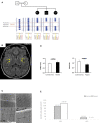SUCLA2 Arg407Trp mutation can cause a nonprogressive movement disorder - deafness syndrome
- PMID: 33231368
- PMCID: PMC7818133
- DOI: 10.1002/acn3.51247
SUCLA2 Arg407Trp mutation can cause a nonprogressive movement disorder - deafness syndrome
Abstract
SUCLA2 is a component of mitochondrial succinate-CoA ligase and nucleotide diphosphokinase activities. Its absence results in Krebs cycle failure, mitochondrial DNA depletion, and a childhood-fatal encephalomyopathy. We describe a purely neurologic allelic form of the disease consisting of deafness, putamenal hyperintensity on MRI and a myoclonic-dystonic movement disorder unchanging from childhood into, so far, the late fourth decade. We show that succinate supplementation circumvents the Krebs cycle block, but does not correct the neurologic disease. Our patients' Arg407Trp mutation has been reported in children with (yet) no MRI abnormalities. It remains possible that early succinate supplementation could impact the disease.
© 2020 The Authors. Annals of Clinical and Translational Neurology published by Wiley Periodicals LLC on behalf of American Neurological Association.
Conflict of interest statement
All authors have reviewed and approve the contents of the manuscript. The submission is not under review at any other publication. None of the authors report any conflict of interest.
Figures

References
-
- Damasio H, Antunes L, Damasio AR. Familial nonprogressive involuntary movements of childhood. Ann Neurol 1977;1:602–603. - PubMed
-
- Kowluru A, Tannous M, Chen HQ. Localization and characterization of the mitochondrial isoform of the nucleoside diphosphate kinase in the pancreatic beta cell: evidence for its complexation with mitochondrial succinyl‐CoA synthetase. Arch Biochem Biophys. 2002;398:160–169. - PubMed
-
- Ostergaard E, Hansen FJ, Sorensen N, et al. Mitochondrial encephalomyopathy with elevated methylmalonic acid is caused by SUCLA2 mutations. Brain 2007;130(Pt 3):853–861. - PubMed
Publication types
MeSH terms
Substances
LinkOut - more resources
Full Text Sources
Medical
Molecular Biology Databases

